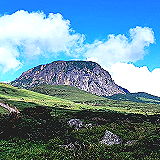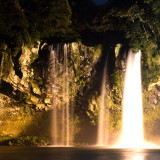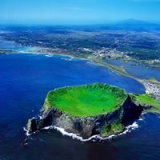
|
Hallasan National Park South Korea, Jeju-do, Jeju-si Last Updated: 09/02/2023 |
| Hallasan National Park is a stunning natural reserve located on Jeju Island, South Korea. It encompasses the majestic Hallasan Mountain, which is not only the highest peak in South Korea but also a prominent symbol of Jeju Island's natural beauty and cultural significance. | |
| - Location: Hallasan National Park is situated on Jeju Island, a volcanic island located in the southern part of South Korea. The park covers a significant portion of the island, including Hallasan Mountain. - Hallasan Mountain: The centerpiece of the national park is Hallasan Mountain, a dormant volcano that rises 1,950 meters (6,398 feet) above sea level. It is South Korea's highest peak and is known for its striking summit crater, known as Baengnokdam. - Baengnokdam Crater Lake: At the summit of Hallasan Mountain lies Baengnokdam, a picturesque crater lake. The lake, surrounded by volcanic rocks and lush vegetation, is a popular destination for hikers. Visitors can hike around the rim of the crater and enjoy breathtaking views. - Hiking Trails: Hallasan National Park offers a network of well-marked hiking trails that cater to various skill levels. The most popular trail is the Seongpanak Trail, which leads to the summit of Hallasan. Hiking in the park provides opportunities to observe diverse flora and fauna. - Biodiversity: The national park is home to a wide range of plant and animal species. Visitors may encounter unique alpine vegetation, including azaleas, camellias, and Hallasan rhododendrons. Birdwatchers can spot native and migratory bird species. - Cultural Significance: Hallasan Mountain holds cultural significance for the people of Jeju Island. It is considered a sacred place and has been the subject of local legends and folklore for centuries. - Visitor Centers: The park has visitor centers and information facilities where visitors can obtain maps, trail information, and guidance from park rangers. These centers also provide insights into the park's natural and cultural heritage. - Climbing Regulations: To protect the fragile ecosystem of Hallasan Mountain, there are regulations in place, including restricted access during certain times and seasons. Visitors should check the regulations and hiking permits before planning their climb. - Access: Jeju Island is accessible by air and sea from mainland South Korea. Once on the island, visitors can access Hallasan National Park and its hiking trails by car or public transportation. - Scenic Beauty: In addition to Hallasan Mountain, the park offers diverse landscapes, including waterfalls, forests, lava tubes, and coastlines. These natural features make the park a scenic wonderland for outdoor enthusiasts and photographers. - Cultural Experiences: In addition to its natural beauty, Jeju Island is known for its unique culture, including traditional folk villages, museums, and local cuisine. Visitors can explore the island's cultural heritage while visiting the national park. Hallasan National Park is a must-visit destination for nature lovers, hikers, and those seeking to immerse themselves in the natural beauty and cultural heritage of Jeju Island. | |
Wikipedia
South Korea » Jeju
Place » Outdoors

|
Cheonjiyeon Waterfall Place » Outdoors Cheonjiyeon Waterfall is a waterfall on Jeju Island, South Korea. It is one of the main tourist attractions on Jeju-do. It is 22 m (72 ft) high and 12 m (39 ft) wide. Though water always falls in one particular area, depending on the amount of recent rain, the water may spread out. At the bottom of the waterfall is an artificial pond that is 20 m (66 ft) deep. Two small dams help keep the water at a specific level. 191 views 💖 1Jeju Island |

|
Jeju Island Place » City Jeju is a volcanic island located off the southern coast of South Korea, in the Jeju Province. It is the largest island in South Korea and is a popular tourist destination, known for its natural beauty, beaches, unique culture, volcanic landscape of craters and cavelike lava tubes. Jeju's 2018 population was 692,032. 460 views 💖 4South Korea |
